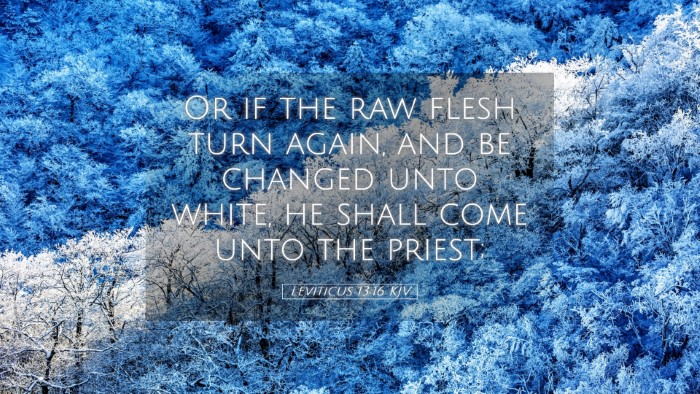Commentary on Leviticus 13:16
Leviticus 13:16 states: "And if the raw flesh turn again, and be changed unto white, he shall come unto the priest;" This verse provides critical insight into the ancient laws regarding leprosy and the procedures for priests in evaluating skin diseases. This commentary synthesizes insights from public domain scholars such as Matthew Henry, Albert Barnes, and Adam Clarke.
Context and Background
Levitical Laws: The regulations surrounding leprosy are among the intricate laws given to the Israelites. These laws served not only as a means of maintaining physical health but also as a spiritual metaphor for sin and purity.
Exegesis of Leviticus 13:16
This specific verse is part of a broader section addressing various types of skin conditions. Its implications reach beyond mere physical health, emphasizing the need for spiritual oversight in times of affliction.
Key Themes
- Transformation of the Condition: The phrase "if the raw flesh turn again" signifies a critical moment where the condition of the afflicted changes. This shift is significant within the context of purification and reconciliation.
- Role of the Priest: The priest acts as an intermediary between God and the afflicted individual. His judgment is necessary in determining whether the individual is still considered unclean.
- Symbolism of White Flesh: The transformation from raw flesh to white may suggest a healing process, representing hope and renewal.
Insights from Commentators
Matthew Henry:
Henry notes that this verse highlights the importance of diagnostic criteria established by God for the priests. He emphasizes that the shift from raw flesh to white signifies a possible reversal of a serious affliction. This change illustrates God's mercies and the possibility of restoration, paralleling the spiritual renewal experienced in repentance.
Albert Barnes:
Barnes reflects on the role of the priest in declaring the condition of the individual. He posits that the priest's evaluation is vital to maintaining the community’s purity and underscores the covenant relationship between God and Israel. Barnes also comments on the hope the afflicted person may feel in witnessing a change in their condition, reflecting God's healing power.
Adam Clarke:
Clarke elaborates on the implications of this transition from raw to white flesh, interpreting it as a sign that something unclean may become clean again. He underscores that the priest's decisions are based upon observable changes, indicating that faith in God’s ability to heal is foundational to the communal and individual practice of faith. His interpretations highlight the dynamics of faith, healing, and communal life, drawing parallels to spiritual renewal.
Theological Implications
The silence surrounding skin diseases in contemporary times compared to ancient practices raises questions about our current understanding of sin and purity. As pastors, students, and theologians explore this text, the following theological implications arise:
- Holistic Healing: The transition from raw to white embodies a holistic view of healing that encompasses physical, emotional, and spiritual dimensions.
- Community Law and Spiritual Integrity: The priesthood serves as a representation of accountability within the community, urging a continuous effort towards communal holiness.
- Grace and Restoration: The passage illustrates how God’s grace provides opportunities for restoration despite the severity of affliction, echoing the New Testament themes of redemption.
Practical Applications
The profound truths derived from Leviticus 13:16 can influence practical ministry:
- Encouraging Pastoral Care: Prudent care for those struggling with various afflictions is essential. Just as the priest provides evaluation and hope, modern-day ministers are called to offer compassion and assistance.
- Promoting Spiritual Accountability: Communities can establish practices that encourage spiritual accountability and support, echoing the priestly role in each member’s life.
- Emphasizing Transformation: Preach on the realities of transformation, both physical and spiritual, as believers navigate their respective journeys toward wholeness.
Conclusion
Leviticus 13:16 reminds contemporary readers of the intricate relationship between law, health, and spirituality. The combined thoughts of Henry, Barnes, and Clarke highlight the profound implications of perceived affliction and the roles of authority given to the priesthood in ancient Israel. As this verse continues to resonate through the ages, it invites reflection on healing, transformation, and the ever-present hope found in God’s mercy.


